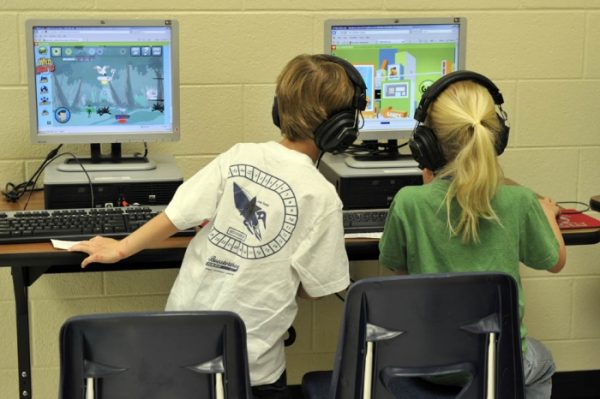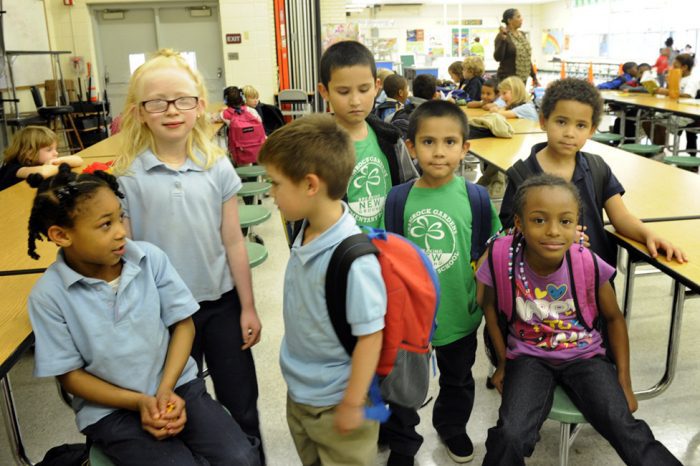COVID-19 closes schools and brings on its own ‘summer slide’

Students lose 20% to 30% of their school year learning gains over the summer and research has found that students of color, students with disabilities and those from low income families experience greater summer learning loss than their peers — and now, the coronavirus pandemic threatens to compound these losses.
The last day CMS students were in the classroom came much earlier this year than anyone had anticipated: March 13. Local educators, along with educators across the state and nation, had to pivot to deliver instruction, assignments and provide additional support such as meals to students remotely. And while districts, schools and individual teachers are responding to the need to totally overhaul instruction and assessment methods judiciously in real time, the system is not set up to lend itself to drastic changes with little-to-no advanced warning.
Parents were also not prepared for this. If they’re lucky enough to keep their jobs they are either working from home (a colleague’s 10 year old shot her with a nerf gun on one of my Zoom meetings recently) or if they are required to report to work physically (which we know low income folks are more likely to be working in sectors where they are considered “essential employees”—fast food service, home healthcare workers, grocery clerks, and other essential retail) they are left scrambling to find childcare.
Neither of which lend themselves well to pivoting to “homeschooling” your children.
[Find all of our coronavirus articles here]
And, if the parent was one of the 600,000 individuals who have filed unemployment claims in North Carolina since March 8 then the time to homeschool may be there, but the money to pay for rent, food and internet access—all necessary things in order for students to be able to effectively learn at home—may have already dried up.
Further, adapting to a new routine and alternative ways of learning can be difficult for any student, but can be a challenge for students with disabilities. Students in Exceptional Children classrooms will need additional support and resources while out of the classroom in order to continue success in school
The effects on students out of the classroom
The education research literature has long established the link between a student missing instructional time and poor academic performance. Increases in individual student absences has been found to decrease math and reading proficiency and high school graduation rates. While instruction is still occurring in CMS via online methods, many students are missing out on this instruction and associated assignments due to a lack of reliable, high-speed internet at home and/or lack of access to a computer: serious obstacles for students who experience this digital divide to complete virtual assignments. These challenges, often referred to as the “homework gap” exist during regular school conditions and have likely been exacerbated by COVID-19 school closures.
Roughly 14% of Mecklenburg County’s 403,000 households do not have broadband internet access at home. Many of these families depend on Charlotte-Mecklenburg libraries to access free internet and other essentials — however, with the libraries closed these students have lost a vital resource needed to continue their course of study for the academic year.
Education researchers have been investigating the loss of educational gains that occurs during summer vacation for more than a century. These losses have been deemed the “summer slide.” An early systematic review of the literature found that student achievement scores declined over summer vacation and that the declines were greater for students from families lower on the socioeconomic scale.
More recent research has found that a majority of the ninth-grade reading achievement gap for low-income students can be explained by summer learning loss, and that all students experience summer learning loss but it is more pronounced for black and Latino students compared to their white peers. While other research has found existing but narrower achievement gaps associated with summer learning loss along socioeconomic and race/ethnicity groups.
Beyond the educational achievement impacts associated with summer, we also know that a number of other familial and social effects of students being out of the classroom persist. Research has found enrichment activities such as museum trips, day-camps, and reading programs to be particularly impactful on student retention of learning during the summer.
While students from all socioeconomic backgrounds are going to be impacted by the lack of camps, museums and programs at the nature preserves, students from lower income families will particularly feel the effects from any changes in the library after-school and summer reading and enrichment programs or Parks and Recreation postponing their weekly science and nature programming.
In addition to learning loss, students who live in households with low incomes experience another debilitating setback from not being in the classroom: the lack of food. According to the USDA, nearly 30 million kids receive free or reduced price school lunch during the school year, but fewer than 3 million kids receive a meal under a summer food service program.
To that end, CMS has set up nutrition distribution sites at 70 schools and has been working to re-imagine, repurpose the busing system; so that instead of stopping in the morning to pick up the students, they are stopping in the morning to drop off meals and other needed educational materials for families who are either immunocompromised and should not leave their home or lack transportation to a site for meal distribution.
The lingering impact of a virus
While the impact of COVID-19 on the economy overall remains to be seen, widespread and long-term economic fallout will affect educational outcomes. Kirabo Jackson and colleagues recently released research investigating spending cuts in education after the Great Recession, which found that reduction in per pupil expenditure is associated with decrease in college attendance, while increases in school spending results in increased individual educational attainment, higher wages and lower incidences of adult poverty.
Additionally, research has found parental job loss (certainly widespread, with more than 22 million unemployment claims in the past month) linked to lower test scores.
How will COVID-19 impact student learning?
The short answer is we really do not know. Drawing on the research literature regarding summer learning is the only body of research we have that looks at learning loss associated with not being in the classroom for an extended period of time. However, even that literature is an incomplete comparison given that educators have the chance to fulfill all the necessary instruction for the school year before sending their students off to summer vacation. And, to the degree that teachers can achieve some level of continuity in their lesson plans throughout the rest of the school year, we know that many students will be left out of accessing those lessons due to the digital divide.

Students at Shamrock Gardens Elementary School in Charlotte, a high-poverty public school near the Plaza Midwood neighborhood. Photo: Nancy Pierce
Further, the students impacted by this are those students from lower socioeconomic backgrounds, who are also the students suffering from food insecurity and overall familial financial insecurity both in real time and in the coming months.
Even though it has been many years, I still remember the anticipation of the last day having to go into the school building for the year. After all, no need to carry your backpack that day as no homework from teachers, who I speculate were also rather ecstatic to not have to go home that afternoon and work on lesson plans for the following day.
While our parents were likely not as excited and relieved for that last day of school—switching to paying for childcare and/or juggling work schedules to patchwork the needs of childcare presents its own challenges, of which low-income families are impacted much more acutely—there is some respite for parents as well in the form of no longer having to assist their kids with the evening homework ritual or that vacation that has been anticipated since the bitter days of winter.
The stay-at-home order for public health has altered those plans: parents are assisting dramatically more with homework, and classroom teachers’ lesson planning and delivery has only intensified. Our students will need continued support of all kinds during this unprecedented time in order to mitigate a Covid-19 induced slump. CMS and other districts across the state and country are putting in extraordinary effort to keep students successful in their learning. It remains vitally important that the community recognize and support the work of our educators and families as they navigate these unchartered waters.